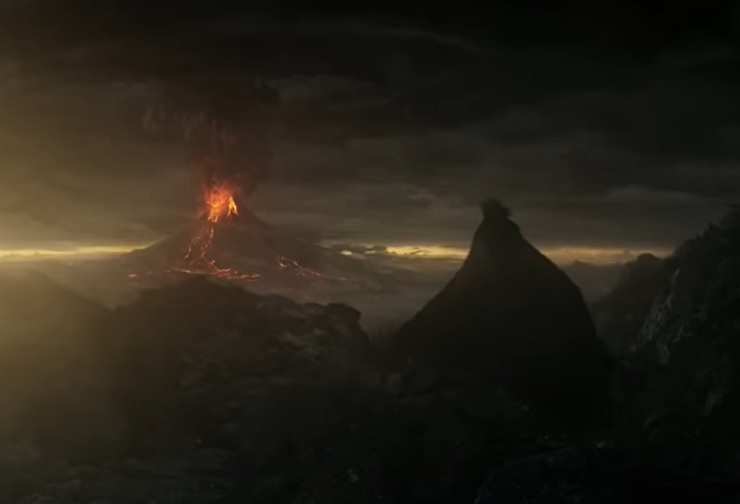The first season of The Lord of the Rings: The Rings of Power sure has been polarizing. One thing this show has been, across the board, is big and bold, both in its story choices and its character depictions. I give them credit for doing nothing hesitant or halfway. It’s been an extravaganza of sight and sound and feeling, for good or ill. And in the finale, episode 8, long-running theories were dashed and/or confirmed; identities were revealed or further teased; fans were elated, impressed, or thoroughly bummed out. It’s all in there, and all out there.
Many critics (a term I am applying only to those who went in with an open mind) like to say things like “The Rings of Power has gone off the rails.” But I don’t think so. It didn’t go off the rails because it was always on a different set of tracks than the book(s). It’s been weaving this way and that over new landscapes, through new plot tunnels, over conflict bridges, and through narrow character canyons. Sometimes the narrative landscape actually resembles one of Tolkien’s, but mostly not. Once we square with the layout of these new sets of tracks, we can try to make sense of it. I struggle with it myself.
So let’s get to it. To say this discussion has spoilers in it would be a serious understatement. But I won’t lie, a lot of this is criticism.
Before I start off harshly, I really want to emphasize that there is still much to recommend this show. I’ve loved nearly everything about the Harfoots (despite going in as a skeptic), the Stranger, future Moria and all its residents, Elrond, and even, at times, Galadriel and Númenor. On these alone I would argue that this adaptation is worth the price of admission. There is so much that’s worthwhile in all of that. I will be listening to the series’ music over and over, long after watching the episodes. The rest, though, that I will grumble about—the compression of the timeline, the reordering of events, the depiction of Sauron, and the character assassination of Galadriel from episode 8—are simply the deep drawbacks.
Let’s start with a summary of what happened in the finale.
Episode 8, “Alloyed” — The Stranger has wandered into the Greenwood alone, but he’s been trailed by the Mystics, who finally confront him. Scarily. They’re all, no worries, we’re here to serve you, Sauron! Over in the grand realm (but which sure seems to be just one nameless city) of Eregion, Elrond and Celebrimbor fuss over not having a solution to the Elves Fading Problem, having been denied mithril by the Dwarves. Galadriel shows up, and what might have been a happy reunion between old friends turns immediately to present concerns: the wounded “low-man” Halbrand and the predicament of the Elves in general. Galadriel and Elrond play catch-up.
When he’s “well” enough, Halbrand manages to wander from the hospital wing of Eregion into the . . . central forge room of Eregion in a way that makes it seem like the recovery room is just downstairs? Were the Elves anticipating frequent injuries with this new forge of theirs? Halbrand flatters Celebrimbor and gives him some ad hoc advice about mixing substances. You know, alloys, something one would think the Noldor, of all the Elves—and Celebrimbor especially—would have thought of before. Celebrimbor is intrigued.
In Númenor, the old king (Tar-Palantir, but who we’ve been told is named Ar-Inziladûn) is on his death bed (well, still), and when Eärien sits to sketch his likeness for his honorary tomb-statue, the old man stirs. He mistakes the girl for his daughter, Míriel, and sends her up into his secret tower room to check out the object hidden within, which of course we already know about). I guess this palantír may function for anyone, not just those with royal authority.
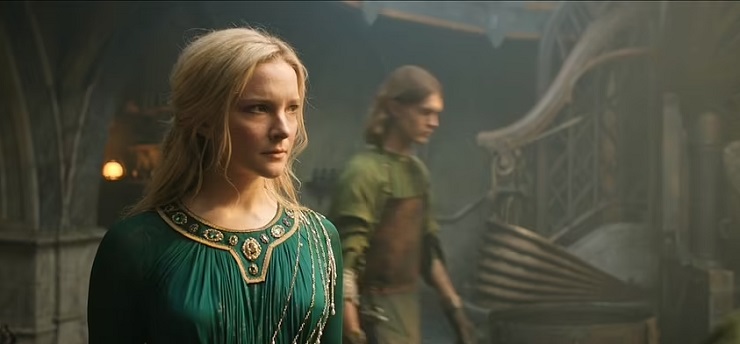
Back in Eregion, Gil-galad, Elrond, Galadriel, and Celebrimbor argue. Celebrimbor seems to have some new ideas involving something round—suggesting a power “not of the flesh but over flesh”—but Gil-galad isn’t having it. He orders Eregion to “disband” (huh?) and is officially throwing in the towel. By quoting Gil-galad’s own words back to him, though, Elrond manages to buy the project three months, so that Celebrimbor can have a crack at “saving all Elvendom.” But Galadriel is now suspicious, having heard the “power over flesh” line before, from Adar, who knew a thing or two about what Sauron used to be experimenting with. Except this time it’s coming from Halbrand, isn’t it? She asks a loremaster to go and find any notes available on the bloodlines of the Southlands, hoping to verify Halbrand’s lineage.
Back in the Greenwood, the three Mystics subdue the Stranger. They tell him they have come from Rhûn and that he is really and truly Sauron; still confused, he almost seems open to the concept. But the sudden intervention by Nori, Poppy, Marigold, and Sadoc turns into a battle with the cultist ladies. Every one of the Harfoots helps. Sadoc is mortally wounded, Poppy hits the spell-slinging lady on the head with rocks (I loved that), and ultimately the Stranger is outed as an “Istar” as the Mystics realize they were mistaken. The three Mystics are finally defeated by the newfound wizard’s conviction that he is not what they wanted him to be, and their banishment is decidedly . . . wraithlike. On the ship to Númenor, Elendil and Míriel speak of the sacrifices that may be required of those who are Faithful (to the Elves, to the old ways, etc.). When they reach their destination, they see the harbor filled with black sails—the signal that indeed, the king is dead.
Back in Eregion, device devising continues apace, with Galadriel giving Halbrand the side-eye as she waits to get results back from the lab . . . err, I mean, lore back from the archives. When it does come in, she sees that there is no existing lineage for Southlands royalty, and there hasn’t been for a long time. She confronts Halbrand in a nearby garden. Here he is outed, at last, as Sauron indeed. Galadriel blinks a lot, trying to rationalize (like a lot of us) why this cannot be. When she finally faces the truth, she attacks him, but the two of them continue the conversation in a psychic memory-nightmare episode in her mind. First on the raft, then in Valinor. Sauron seems to suggest that it was her who convinced him to come back to Middle-earth, that he only wanted to remain in Númenor. He tempts her, she rejects him. He leaves her to drown in the river without ensuring her death—classic Bond villain mistake—but Elrond pulls her out. Instead of aborting the creation of a ring, which Sauron had suggested could be two, she simply insists that three be made. “One will always corrupt. Two will divide.” Halbrand has vanished, but she also doesn’t tell the others who he is; she only says that he cannot be trusted. Elrond suspects something. Back among the Harfoots, it is decided that Nori will go with the Stranger on his continued adventure towards Rhûn. Poppy will be the Harfoots’ new Trailfinder.
Over in Mordor, where he’s traveled back to the south, Sauron has scored himself a Sith cloak. He smiles for the camera—evidently not bothered in the least for not having won over Galadriel—and then walks on towards Mount Doom.
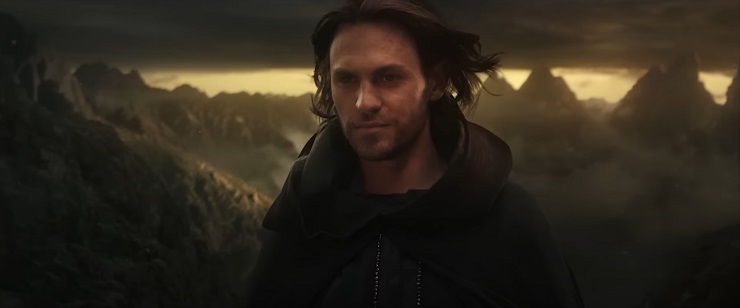
Now for the particulars. Oh, and a reminder: the “RoPer” adjective is just my shorthand for “the Rings of Power version of a Tolkien-invented character.” Now let’s get to it, starting with the Dark Elephant in the Room.
Annatar / Halbrand / Sauron: Back in February of this year, when all we had was the Super Bowl teaser to chew over, I theorized that “Raft Man” might have been Sauron in disguise but I didn’t really want to voice it. I mean, there wasn’t much to go on yet. It was just a gut feeling that they would introduce him as a good guy early on, but not as Annatar, the guise “both fair and wise” that he adopts in The Silmarillion. Then when the show began and we actually met the refugee Halbrand, I dismissed the theory. The more we followed him, despite the “clues” that at least looked like red herrings, the whole set-up seemed far too contrived, requiring far too many leaps of logic, to make him Sauron, after all. Tons of people were guessing that it was him all along.
And in the end, I was mistaken, after all. I’m glad I was. There are so many aspects of the situation that I find far-fetched. Then again, this may be because I’ve read so much more about Sauron than The Lord of the Rings (and Amazon rights) has to work with. So what we have here—and what I have to keep reminding myself— is simply a very alternative Sauron that showrunners McKay and Payne have invented. We have RoPer Sauron, who somehow got himself on the floating wreckage of a ship far, far out on the sea west of Middle-earth.
Were the other raft survivors phantoms of his devising, or were they legitimate mortals unaware of him? Where was he going? It sure seems like timeless Sauron, future Dark Lord, could have succeeded if he’d actually been trying to reach Númenor. Was the sea monster part of his sorcery, or was that even real? I’ve heard it theorized that it might have been sent by Ulmo, the Vala of all waters, to sabotage him—but that would be digging a spoon deep into The Silmarillion, and if you can do that, then this shouldn’t be so alternate a Sauron as we got.
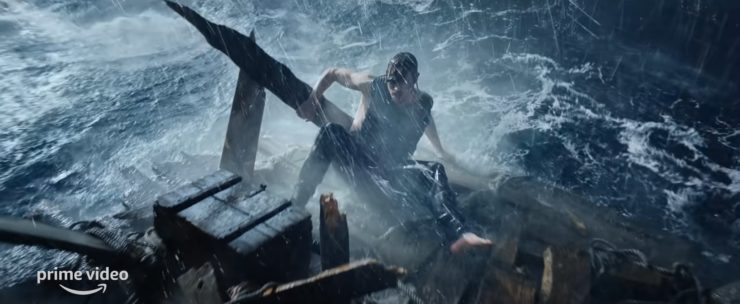
Take Gil-galad. Doesn’t it seem like an odd choice, for writers with the full majesty of The Lord of the Rings available to them, to depict the High King as weak and haughty while portraying Sauron as a former bad guy who’s trying to be a nice guy but who gets steered back into evil by one of Middle-earth’s staunchest defenders (Galadriel)? I mean, it’s gutsy. This Sauron was just trying to turn over a new leaf, apparently. But it was Galadriel’s efforts to get back to Middle-earth that turns him back to his old tyrant’s ways? He is, throughout the run of this show so far, a gaslighter and an abusive friend/partner/whatever, and he now he will return to being a mass murderer—specifically due to her prompting (if unknowingly on her part). That story choice is more shocking, to me, than the idea that the true villain was under the heroes’ noses this whole time. Because of course he was. That aspect of Sauron was never a problem. Many viewers assumed, as I did, that Sauron was simply hiding in plain sight among the Elves of Lindon or Eregion this whole time, and was the reason behind the absurd mithril-as-necessary-drug plotline.
This is not to say that the Halbrand-as-Sauron scheme is wrong through and through. Of course not. I would say this show doesn’t get anything wholly wrong. It even gets some things right. But what it does get wrong, when scaled out, becomes problematic for Tolkien’s world. I will say again that I don’t think we’re seeing writers (or at least showrunners) stumbling through the lore without knowing it. I think they know it—a lot of it, maybe all of it—but they may not always understand it. I think their changes to these characters are deliberate. For example, yes, Sauron is a deceiver. Hell yeah. That’s accurate. He’s not going to march around Middle-earth at this stage in his black spiky armor. I get that; even Tolkien knew that. But this “bad boy” version of Sauron that some are swooning over, who if left alone might have turned out okay? That’s not very Tolkienian at all.
Buy the Book
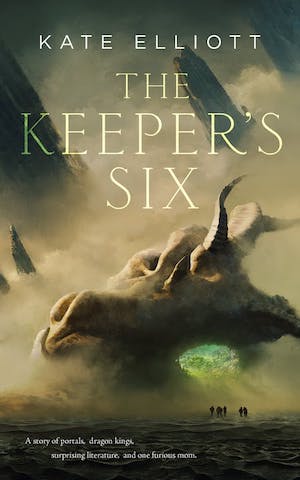

The Keeper’s Six
The showrunners may not have been able to use The Silmarillion‘s story, but this “origin story” of the dark lord of the rings didn’t need to be incompatible with Tolkien’s larger ideals, did it? So while we can’t look to The Silmarillion for its stories, we can allow it to show us what Tolkien himself intended for the character of Sauron. For example, until Sauron meets the Númenóreans and their armies come to the aid of the Elves in his war against Eregion and Lindon, he’s only concerned about the Elves. And even before that, long before his ring-scheme was conceived, he went from shame and fear to pride after the defeat of Morgoth. His moment of near repentance is real (which The Rings of Power sure is trying to capitalize on, despite not having Silmarillion rights), but it’s very brief, not something he ruminates on for centuries. He does try to surrender at first to the herald of the Valar, but when he realizes that he’d have to humble himself, to go back to Valinor and almost certainly serve time, he abandons the notion. He’d only hoped to escape accountability, anyway. So Sauron looks around and judges that the Valar, with Morgoth now removed, have given up on Middle-earth. So what he wants early on in the Second Age is to order the world according to his vision. But he knows he can’t just assume control because there are still Elves around. Oh, sure, if it was just the “lesser” Men that peopled Middle-earth, mortals scattered in tribes and small nations around the continent, he could have mopped the floor with them or made them his slaves or servants.
But the Elves? And those Númenóreans? In “Of the Rings of Power and the Third Age,” we’re told:
He looked with hatred on the Eldar, and he feared the Men of Númenor who came back at whiles in their ships to the shores of Middle-earth; but for long he dissembled his mind and concealed the dark designs that he shaped in his heart.
Even if Saulbrand was chewing on the idea of not going back to his old ways, tell me, did he ever seem like someone with hatred for the Elves or fear of the Númenóreans? Like, even a little? Of course he can put on a false face, but we do get a few moments where he is alone, with no one around for him to deceive with appearances. There is only us, the audience, looking on through the immersive fourth wall, while Sauron sits in contemplation or stands in the dark with his eyes wet. He seems to be genuinely wistful or unsure of his path, doesn’t he? If only Tolkien’s most powerful female Elf character didn’t unwittingly prod him down the wrong path. I don’t find that a good look.
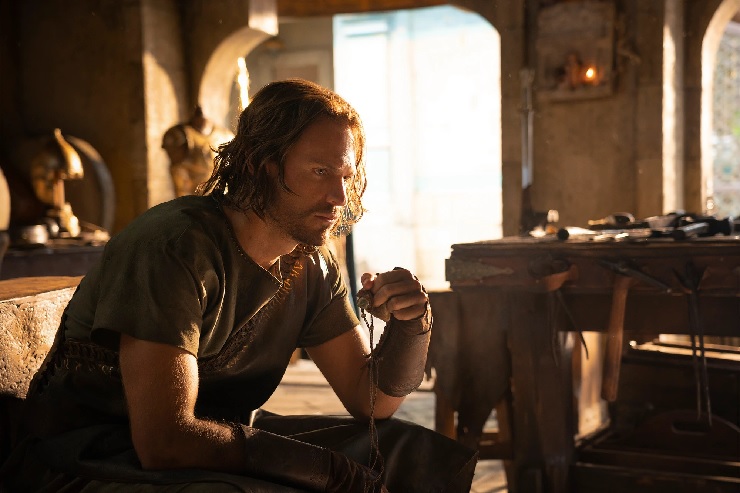
The Rings of Power writers have tried to make Sauron relatable. I am now genuinely curious what others—what you—think about that. The show has now spun him as a handsome rebel that maybe the right woman could theoretically change. That old cliché. And now follows the fanboy/fangirl crushing within the show’s fandom, which to me is a shame. Yes, Sauron can be made complex. No one said he should be a one-note, shallow character. He was not evil in the beginning, that much is true, even in Tolkien’s vision. But the key word is beginning. Way back before time, before the universe, he had another name and he was not evil. He did at some point choose to be, though, and he followed Melkor/Morgoth onto the path of rebellion and evil all through the First Age and even before it. Sauron’s point of no return is well past by the time he is supposed to start making trouble in the Second Age.
But all right, I know, I know, that’s Silmarillion talk and they simply could not walk through that. It’s a tough spot for the showrunners to be in, I suppose. Before the showrunners even came onto the scene, Amazon had secured only Hobbit and Rings lore; JD Payne and Patrick McKay’s pitch, which was accepted, would not allow them to use specific information from anywhere else, except in bits and pieces (like that map of Númenor). I get all that. No matter what, they would have to invent new movements for our beloved, still-alive-in-the Third Age characters (Galadriel, Elrond, Gil-galad, etc.), all new ideas concerning what the Rings of Power were, how they came to be made, and just how Sauron deceived everyone. But . . . did this mean they had to make their story incompatible with the books they couldn’t use? Did it mean they had to re-define those beloved characters from their Lord of the Rings incarnations? I guess that’s my sticking point.
To be fair, Jackson did this to some extent, too. He did it, hardcore, with Faramir. He did it a little bit with everyone, really: he made Frodo younger and more naïve, Elrond grimmer, Galadriel creepier and less comforting, and Aragorn was less confident. Though I think Jackson made Boromir actually more likeable, if not as deeply rooted. It’s not new to change aspects of a character in adaption. Yet I struggle with the writers’ choices here, and especially with their attitudes toward the source material.
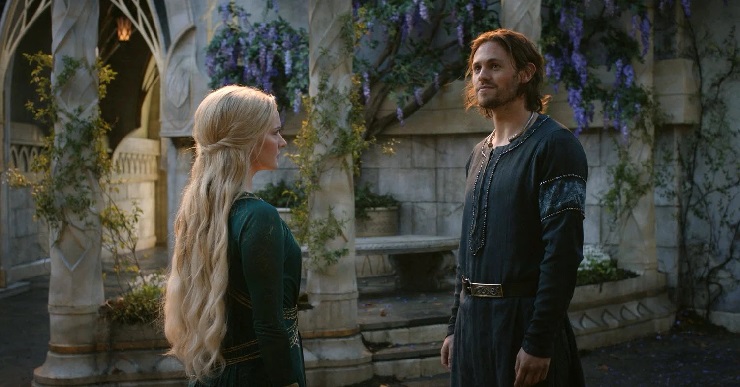
The showrunners were asked about the Sauron reveal in the episode 8 entry of The Official The Lord of the Rings: The Rings of Power Podcast, and JD Payne said the following:
If you sort of think about the obvious way, it’s, okay, a tall mysterious beautiful demigod named Annatar shows up and says, you know, ‘Let me help you with all your problems by making you some rings.’ Who’s going to fall for that?
By “obvious way” he means The Silmarillion way. Tolkien’s way. Is Annatar the obvious way? Or was it the best way for what Sauron was trying to achieve, without regards to the need for a mystery box? The narrator of The Silmarillion doesn’t try to trick the reader, only the Elves. So yeah, that quote makes me cringe, perhaps more than anything in the show itself. Because it sounds like an excuse. If they didn’t run with the Annatar concept because they simply didn’t have the rights to do so, that’s one thing. But saying, “Who’s going to fall for that?” tells me they thought Tolkien’s own idea was a flimsy one, or at least they’re using that position as a justification for their choices.
Well, what do readers think? How do they regard Tolkien’s all-too-brief account of the Second Age, wherein Sauron convinces the Elves to forge a batch of powerful rings through which he intends to dominate them? He did so by appealing to the Elves’ unrest, to their desire to remain in Middle-earth and make it as blissful as Valinor had been. They were seduced by his mad ring-skillz. He moved among them and guided them; it was a long and gradual process. 300+ years, in fact, by Tolkien’s timeline. Elves are smart and perceptive, so Sauron put in the work, both to teach and to deceive.
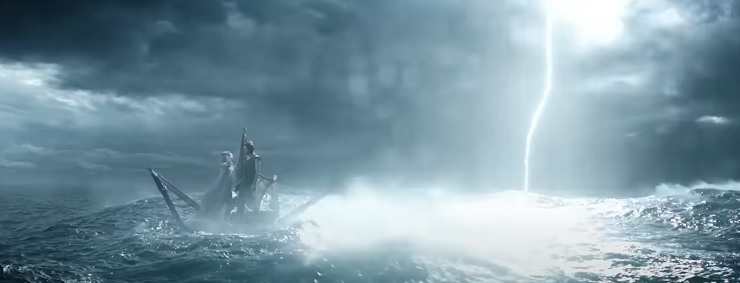
But okay, so that’s The Silmarillion and Unfinished Tales version. I know I have to let that go. Let’s look, then, at the situation only from the bounds of The Lord of the Rings, which Payne and McKay absolutely were able to work from. It was still knowledge that Sauron offered the Elves—knowledge to achieve what they wanted to achieve (whatever that might be), to craft to make what they wanted to craft. Here’s how Tolkien describes it in “The Council of Elrond”:
. . . he told of the Elven-smiths of Eregion and their friendship with Moria, and their eagerness for knowledge, by which Sauron ensnared them. For in that time he was not yet evil to behold, and they received his aid and grew mighty in craft, whereas he learned all their secrets, and betrayed them . . .
Their eagerness for knowledge. Does that read like one interpretation might be “. . . and their eagerness for knowledge to stop their race from dying, by which Sauron ensnared them”? That’s the stretch here. Remember Halbrand’s jailbird advice to Galadriel? He says “you’d do well to identify what it is that your opponent most fears…[and] give them the means of mastering it. So that you can master them.” That was one of the great clues to Halbrand’s true identity. And while indeed “not yet evil to behold,” Halbrand ends up spending very little time in the forge-room of Eregion after wandering in from the sick ward. It seems mere days, at most (maybe weeks, if we’re generous), and that’s only after presenting some vague but initial smithing ideas that allowed Celebrimbor to recalibrate. Having Sauron be present and involved for most of the work that created the Three Rings that would eventually be known as Vilya, Nenya, and Narya also feels disingenuous to the book. They’re supposed to be the only three that Sauron’s “hand never touched” or sullied.
“All of this springs from the text,” the showrunners insist. I would say it stretches from the text, at best.
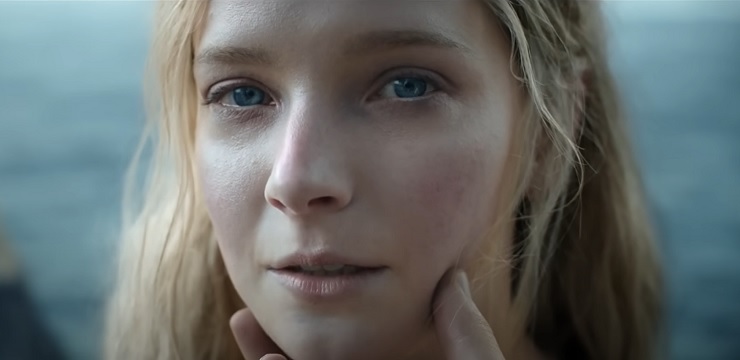
In the same podcast interview mentioned above, the showrunners were asked if actor Charlie Vickers would be still playing Sauron in future seasons. Would he take a different shape? They were coy about this, but they admitted that his Halbrand form has now been outed, and that there are still Seven Rings yet to be given to Dwarves, and Nine for Men. So this has me wondering if those Seven and Nine will each be a season’s worth of story, and whether the Elves will even be involved in further ring-making! I mean, they should be, right? But who knows, at this point? I think a lot of new soap opera drama would be needed to bring Sauron back to Eregion again. Galadriel and Gil-galad could be pushed away so as to inch closer to Tolkien’s own summary (those two famously refused to treat with Sauron), while Celebrimbor could go all-in. But it’s been made weird now.
I know that it takes continual effort to push aside the extended legendarium and remember that this is a version of the story that expands back through time only from The Lord of the Rings. That it is an alternate version to Tolkien’s own. If it can’t use a bunch of the stories that Tolkien did write, I at least want it to be relatively compatible with them. Does that seem like a fair expectation?
So all right. So RoPer Sauron tried to leave his evil past behind and was just trying to settle into a simpler life as a blacksmith or whatever? Okay. But this still needs to be the Sauron of which Gandalf will one day say this in “The White Rider” chapter of The Lord of the Rings:
Indeed he is in great fear, not knowing what mighty one may suddenly appear, wielding the Ring, and assailing him with war, seeking to cast him down and take his place. That we should wish to cast him down and have no one in his place is not a thought that occurs to his mind. That we should try to destroy the Ring itself has not yet entered into his darkest dream.
RoPer Sauron does seem nuanced enough to imagine these things things—that some people, given the opportunity, might not want to rule over everyone else, that they would destroy an object of power. He’s traveled in the company of heroes and commanders (Galadriel, Elendil, Míriel, and who knows how many others) and heard their concerns, and seen their plight. He’s not just an aloof force of evil in the shadows, but one who has dwelt among them like he’s one of them. This just doesn’t feel like the show has figured Sauron out yet.
Balrog: Hey, Durin’s Bane didn’t bust out yet, after all! Good. That’s worth something. They teased it, but then they held back. I’m holding onto hope that they save that for the final season, not the next one.
Catacombs in Eregion: Catacombs. That’s where the Vulcan Elf loremaster told Galadriel that he’d have to go to find anything on the bloodlines of mortals. But . . . what gives? Catacombs are “subterranean cemetery of galleries with recesses for tombs.” It could be stretched to be any underground passageway or group of passages, but still, that sure seems like an unusual feature for an Elvish realm (where wine cellars would be fine), given that Elves don’t just age and die in those ways. I think they were just trying to come up with the Elf equivalent of a dusty attic or moldy basement, to imply that Elves don’t normally need to keep archives on anything other than Elves. And sure, Elves definitely record their history from decidedly Elven points of view, and pay less attention to the history of Men, but come on. They’re making them extra jerky here. I suppose this at least makes one appreciate Rivendell more.
But word choice, in any Tolkien adaptation, should matter more, shouldn’t it? Just like when RoPer Elrond and RoPer Celebrimbor were approaching the gate of Khazad-dûm in episode 2. Celebrimbor has a line, a lovely line, that I really enjoyed the first couple of times I heard it. It spoke well of the Dwarves. Heck, it even spoke well of the writers. Celebrimbor says, “They sculpt the rock with the respect of one who cares for an aged parent.”
I love that. I get that. If you’re someone who’s ever had to care for someone older and in need of assistance, whether close family or not, it means even more. But then I thought about it. Why would an Elf say this, and to another Elf? Is this a common experience for them? I don’t think so. Elves in Middle-earth age, if very slowly, but they’ll never become infirm or physically impaired; they would not need to be cared for in the way that Celebrimbor is implying here. Had he said this line to a Man, it might make more sense; it would be him trying to say something that they would understand, as mortals. But it’s ill-fitting for an immortal Elf to say this to an immortal Elf. Heck, both Celebrimbor’s and Elrond’s parents are long gone, but neither had to care for them in this way. So while the words are nice, the context isn’t right. This is how dialogue and word choice in this show have been. Sometimes it’s awkward, and sometimes it’s splendid, but sometimes even when it’s lovely it might still feel off, because it doesn’t feel it belongs in a lived-in Middle-earth.
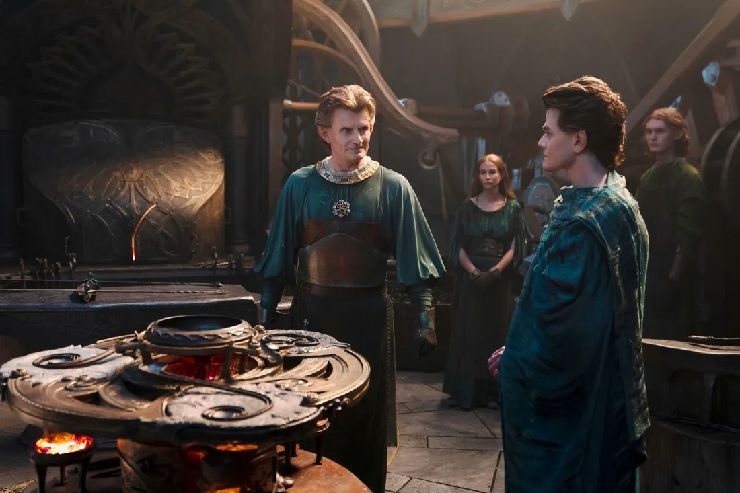
Celebrimbor: I really do like Charles Edwards but I think his talents would have been better served in another role. RoPer Celebrimbor seems to be a far cry from the wunderkind the grandson of Fëanor ought to be. Yes, he’s supposed to actually learn from Sauron, but the brief exchange between RoPer Sauron and RoPer Celebrimbor about mixing alloys felt vague and amateurish.
Galadriel: I’ve said a lot about Sauron, but honestly, the biggest disappointment from the revelations of episode 8, and by extension the whole show itself, lies in what they’ve done with Galadriel all this time (but which we didn’t know for sure until now). I’ve liked her well enough throughout—she’s still felt like a heroine to get behind, and it helps knowing what her future is like—but they’ve done the character dirty now. They’ve actually made her complicit in Sauron’s return and rise in both the Second Age and Third. They’re implying that it was her persistence in hunting him that literally flushed him out and brought him to all the important places where he can inflict the most damage. If one were to accept the show’s take, and make it part of their head-canon, then a read of “The Mirror of Galadriel” is particularly twisted. She would be harboring guilt all throughout the millennia that followed. Even if she was fooled. Even if she didn’t mean it (because of course she didn’t).
Worse, they’ve made jerkface RoPer Gil-galad right! Gahhh. After she sailed off toward Valinor, Elrond remarks to the High King that Galadriel was so certain that her search for Sauron should have continued. Gil-galad answers:
We foresaw that if it had, she might have inadvertently kept alive the very evil she sought to defeat. For the same wind that seeks to blow out a fire may also cause its spread.
I mean, that’s exactly what has happened. Had Galadriel left well enough along, Sauron might have faded into obscurity on his own. That’s what they’re implying.
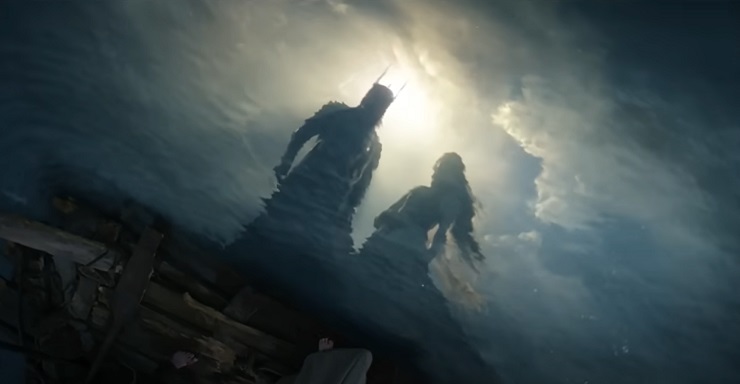
Is there some way back from this? Unlikely. But who knows what the writers will devise in seasons to come? Could they somehow reveal that Sauron was on that shipwreck-raft, somehow working on a plan to return anyway, and his running into Galadriel simply meant an opportunity to have a partner in his crimes? Sure, they could, but that’s . . . weak. He didn’t really need her, after all. And when he fails to win her over, he’s not upset.
It’s clear from the interviews that the showrunners were aiming to show Sauron actually trying to leave his dark past behind, after all. Both character choices explored here sure are a far cry from what Tolkien himself kept returning to in his own post-Rings musings about Galadriel. The showrunners can’t use those stories, but they can use the themes of those stories. But they aren’t. Now, I get the parallels they’re trying to make with light and dark. With real light and reflected light. I get their wanting to show the path Galadriel could have started down, as a precursor to her speech to Frodo when she is tempted by the One Ring.
But I’m not a fan of the implication. And it also means that parts of Galadriel’s speech to Frodo in year 3019 of the Third Age has her directly quoting Sauron. “Stronger than the foundations of the earth” and all that. Well, at least they didn’t have RoPer Sauron also say to her, “All shall love you and despair,” because that’s such a brilliantly chilling line and she deserved to compose those words herself. Stop giving women’s cool lines to dudes, Rings of Power!
When we finally know (or meet) the person who will one day become the Witch-king, the lord of the Nazgûl, they’d better not have him nudge someone and remark, “I like to stand between others and their lords and kin. Oh, I am also deathless. And I’m going to be totally living or dark undead. No one can smite me.” Nudge, nudge.
Gil-galad: I’m crossing my fingers that the showrunners really work on his arc, so that one day we’re cheering when he values his smart friends and takes up arms against Mordor. I recently finally watched the ridiculous but fun Abraham Lincoln: Vampire Hunter (2012), and if you haven’t seen it, you should know that Abe is played by Gil-galad (Benjamin Walker), his dad is played by Adar (Joseph Mawle), and one of their vampire enemies is Jackson’s Celeborn himself (Marton Csokas)! Benjamin Walker can sure swing an axe! So I have some hope that we’ll someday see Gil-galad and some sweet, sweet spear-swinging action. Aeglos!
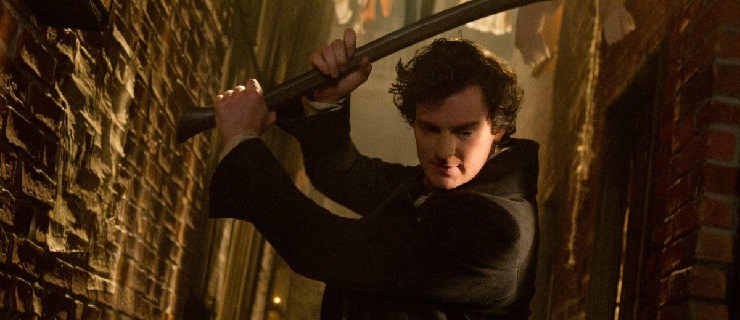
Mithril-as-necessary-drug: Ehh. They never pulled back on this at all. Really seems like mithril emits Silmaril light in RoPer Middle-earth, after all. Dang it. Can’t the Dwarves, who are so excellently portrayed in this show, have something that’s wholly theirs to find? Must their special ore need to originate in Elves, too? (Fëanor, the greatest of all Elven crafters, having made the Silmarils.)
Mountains and Trees: When Gil-galad is talking to Celebrimbor, Elrond, and Galadriel, the High King says, “Since the mountain of fire’s eruption the Great Tree is all but bleeding leaves.” Now, is there meant to be some link between Mount Doom and the Great Tree of Lindon? They never did resolve the situation of Elven souls, the blight on the Tree, and the need Elves seem to have for mithril-light. No theories or myths were debunked. In the very least, I had hoped someone would say something significant about the eruption of Orodruin. Are we to even assume Galadriel said a word about the Southlands, Orcs, Adar . . . any of that . . . to the others in Eregion? She probably filled in Elrond on most of it, but it’s frustrating to see no discussion of the evil that Gil-galad implied was gone for good back in episode 1. And what about Gil-galad’s disbanding of the Elven outposts? He’d declared “that the days of the war were over.” Why did he do that? Did that have something to do with the blight that had started to show on the Great Tree? Was that about their dying/fading? If so, fine, but say that! And what about the sapling that grew in Durin and Disa’s home? Why did we never go back to that? It was such a swell idea, and now feels like a missed opportunity.
In a show about rings, some things ought to come full circle, surely?
Mystics & The Stranger: We haven’t learned everything about the three Mystics, but we can do some guesswork now. They’re from the region called Rhûn. They thought, or at least hoped, that the Stranger was Sauron, which means they’re either part of Sauron’s service of old, or Morgoth’s. Or possibly they’re servants of a bad wizard merely looking to align themselves with Sauron.
When the Stranger, the Istar, defeats them, their dissolution is decidedly wraithlike. That’s no accident. It’s another callback to Jackson’s version of the Nazgûl as seen by a Ring-wearing Frodo, where he could see into the “wraith-world,” as Gandalf called it in the book. This doesn’t tell us very much, except that it feels like necromancy, which is very much associated with Sauron. Does this mean that these three are or were mortal women whose bodies were subjects in his experiments with the unseen world, “not of the flesh, but over flesh”? Or is that something anyone dabbling with evil power can try to tap into?
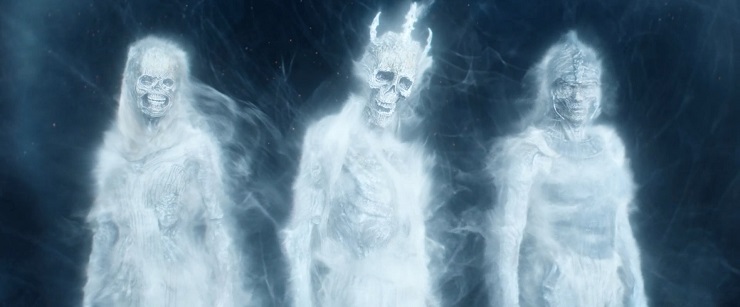
Very unofficially, and far from anything “canon,” Tolkien himself only speculated loosely about some wizards who might have gone bad when they came to Middle-earth. They are the Istari, and in a letter to Rhona Beare (Letter #211 from The Letters of J.R.R. Tolkien), he wrote:
I think they went as emissaries to distant regions, East and South, far out of Númenórean range: missionaries to ‘enemy-occupied’ lands, as it were. What success they had I do not know; but I fear that they failed, as Saruman did, though doubtless in different ways; and I suspect they were founders of beginners of secret cults and ‘magic’ traditions that outlasted the fall of Sauron.
It could be this sort of thing that the show is playing with, and reinventing. “He is not Sauron. He is the other. The Istar.” So is there a second Istar who came before him? Since moths are tied with Gandalf in the Jackson films, is the moth imagery in their banishment a reference to an Istar who these Mystics already serve, who in turn went bad and served Sauron? Good or bad, wizards and moths seem to be a thing in adaptations now. Also, why does only one of the three Mystics (the Dweller) seem to wield sorcery, while the others just use weapons. Well, these are just curiosities at this point, and don’t need immediate answering anyway.
Rhûn: The word rhûn simply means “east” in Sindarin. Why would someone from Rhûn call it that? And why would someone who is from there call their own stars strange? This is a quote pulled from Aragorn, when he calls when he refers to both Rhûn and Harad, lands he himself had traveled to, “where the stars are strange.” I’m of course excited to see where this plotline goes, and indeed if this Istar-who-is-probably-but-not-absolutely-clearly-Gandalf actually goes there, doing Blue Wizards’ work, and what that culture will look like? Will they call themselves exotic and strange? I sure hope we see the people in that land see themselves as normal.
Ring Sequence: In The Silmarillion, an unspecified number of Rings of Power are made by the Elven-smiths in Eregion, under Sauron’s guidance (in his Annatar disguise). Only after he makes the One Ring do we learn that of that batch of rings, Three in particular were made without his involvement, and were “forged by Celebrimbor alone.” But he gets a hold of all the rest, and from that number he ends up giving seven to Dwarves and nine to Men. Thus it’s clear that sixteen Rings of Power were made, then three separately, then the One.
All right, but forget that for a moment. The Lord of the Rings doesn’t give us the full summary of events involving the Rings, but we do get this from the Second Age timeline (and thus The Rings of Power had this before them):
1200 – Sauron endeavors to seduce the Eldar. Gil-galad refuses to treat with him; but the smiths of Eregion are won over.
1500 – The Elven-smiths instructed by Sauron reach the height of their skill. They begin the forging of the Rings of Power.
1590 – The Three Rings are completed in Eregion.
1600 – Sauron forges the One Ring in Orodruin. He completes the fortress of Barad-dûr. Celebrimbor perceives the designs of Sauron.
1693 – War of the Elves and Sauron begins. The Three Rings are hidden.
Forget the years. They compressed the timeline and shoved all of this up near the fall of Númenor. But still, that’s the order of the Rings, and it’s right there in the useable text. Why, then, make the Three Rings first and involve Sauron directly? Probably because to the average casual Tolkien film and TV fan, the timeline from Appendix B is obscure. While the dramatic ordering of the names from the famous poem is not.
Three Rings for the Elven-kings under the sky,
Seven for the Dwarf-lords in their halls of stone,
Nine for Mortal Men doomed to die,
Three, seven, nine. Which has me think we won’t be seeing future Nazgul for a while, still.
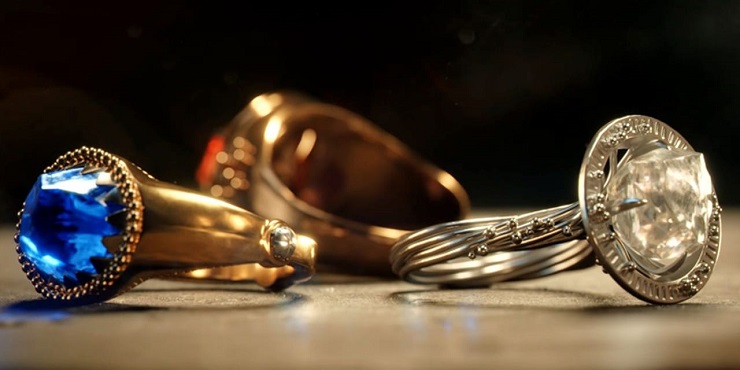
Valinor: There was little talk of Valinor in the season finale, but I still feels like it’s one of the greatest missteps that the show has made. I’m talking about its brief portrayal (which still has elements of AWESOME) and the means to reach it (an unmanned ship sailing into an ominous glowing portal), but especially its use in the show as a place of banishment. Gil-galad trying to send Galadriel there to get rid of her is about as opposite of Tolkien as anything I can imagine. People get exiled from Valinor, oh yes, but reversing that feels like the entire idea of Valinor is deeply undermined. If all I knew about Valinor was from what The Rings of Power shows us, I wouldn’t be very impressed. It seems almost oppressive. But damn, the “Valinor” theme in the soundtrack is excellent.
In conclusion, The Rings of Power is another Tolkien adaptation full of exciting, inspiring moments and absolute misfires. Because this one is a “prequel,” it’s hard for me not to compare it to Star Wars’ Episodes 1–3. Sure, we can see Anakin as a little kid, then an annoying teenager and young man, and find things about him that are endearing. But it’s either too much information or the wrong set-up for him that, ultimately, don’t much improve the character of Darth Vader…they might even be knocking him down a few pegs. Seeing this earlier and “younger” Sauron isn’t merely seeing how he came to be the Dark Lord of the Third Age; it’s recasting that same Dark Lord and making him something he wasn’t.
***
Ah, but what do I know? What do we know? We’re Tolkien fans, not TV show producers or writers. Or marketers. Well, maybe some of you are. I’m just a book nerd who tries to see the best in things even outside the books, but even I have the need to vent sometimes. I still defend The Hobbit trilogy of films for their right to exist, and I think that despite a bunch of missteps a lot of good came out of them. And so they will come out of The Rings of Power. There is already a crop of newborn baby Tolkien readers coming into the fandom.
I am absolutely still keen on seeing where this show will take us. I’m interested to see if any decisions made in the next season will make better sense of this one. I suspect that there are things they can’t just reel in or dial back. Galadriel is the big one for me. But I’ll give them a chance. I’ve still got a lot of respect for the legions of people who made this thing. I wanted it to be better, because it’s Tolkien, but it’s still got a lot of heart in it.
And honestly, one thing this adaptation does (that nearly all of them do) is make me appreciate the books all the more. While Halbrand screams right at the camera, close up, or smirks as he walks off towards Mount Doom, the facelessness of Sauron in the book is terrifying. Tolkien made his overarching Dark Lord scarier precisely because he lurks beyond the pages and in the corners of our imagination. We see him not in the expression of an actor but in the ways his power has tortured the natural world; in the ways he corrupts mortal Men and makes them into black-clad ghost-things that “cried with the voices of death”; in the ways that good men and women mistrusted one another; in the ways that Elves are seen to be estranged from their old mortal friends; in the fact that Galadriel, who Tolkien envisioned as Sauron’s antithesis despite her sins of pride, is feared by Men as some kind of forest witch and that those in her favor must be “net-weavers and sorcerers.” We see Sauron not with a swooping black Sith cloak but in the awful heaviness laid upon Frodo’s mind and body simply by carrying around something made by him. We see him in the fear that Sam feels while watching his best friend suffer.
No matter what form it takes, more talk of Tolkien is a good thing. Where Middle-earth is shown to be beautiful and memorable—awesome, we’re lucky to have it. Where it’s made to be subpar, well, we can talk about that, too, and just appreciate his world all the more.
Jeff LaSala is responsible for The Silmarillion Primer, the more recent and much shorter Second Age Primer, the Deep Delvings series, and a few other assorted articles on this site. Tolkien nerdom aside, Jeff wrote a Scribe Award–nominated D&D novel, produced some cyberpunk stories, and works in production for Macmillan and the Tor Publishing Group. He is sometimes on Twitter.










